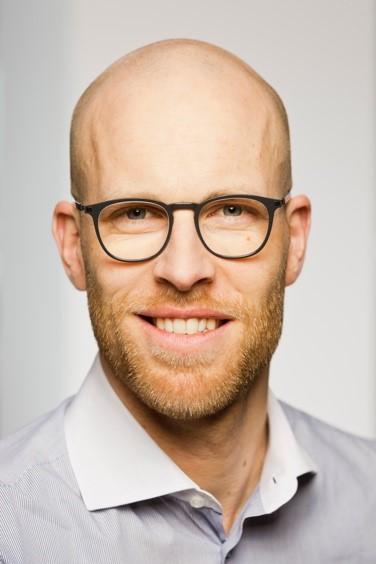SUPRAVACC project is based on a modular concept using individual molecular building blocks for the preparation of fully synthetic vaccines

Credit: photo/©: Eric Lichtenscheidt
Professor Pol Besenius, a chemist working at Johannes Gutenberg University Mainz (JGU), has secured funding from the European Research Council (ERC) for the development of fully synthetic vaccines. Among other things, Besenius aims to overcome the problems of poor stability and short shelf life of current vaccines. The basic concept for the design of new vaccines is the preparation of a platform using molecular building blocks that will self-assemble into disease-specific vaccine candidates. Over the next five years, the SUPRAVACC (Supramolecular engineering of glycan-decorated peptides as synthetic vaccines) project will receive EUR 2 million in funding from the European Research Council. The ERC Consolidator Grant is one of the most richly endowed EU funding awards.
The most important role of vaccines is the induction of immunological memory, which is crucial for long-term protection against pathogens. Current strategies used to ensure the effectiveness of antibacterial and antiviral vaccines rely on the attachment of pathogen-specific identification markers to carrier proteins. Unfortunately, the stability of the resultant formulations is poor while their shelf life is short, which limits their use in developing countries. The development of new vaccines to treat endogenous disorders such as cancer remains a challenge, as it is not possible to create modular or tailor-made vaccines with currently available techniques.
“I will focus on a radical new design approach to produce fully synthetic, supramolecular vaccines,” explained Besenius. The aim is to synthesize carbohydrate and glycopeptide epitopes and to attach these to supramolecular building blocks. Epitopes are structures or parts of molecules that can trigger a specific immune response. The disease-specific antigens and immune stimulants can be attached to customized supramolecular building blocks.
Self-assembly kits provide supramolecular components that put themselves together to form vaccines
Supramolecular materials are produced via the self-assembly of molecular building blocks that combine to create ordered polymer structures. Because the components self-assemble into nanoscaled particles, they can be used as subunit-vaccine building blocks. With the help of the proposed approach, vaccines with a wide range of applications can be generated by means of the formation of application-specific particles through co-assembly of components with tailored functionalities. “All we will have to do is define the required composition of the mixture. The building blocks will then do the rest and self-assemble into tailor-made nanostructures”, said Besenius. This modular concept also ensures that the resultant vaccines are free of biological contaminations while the components themselves can be more readily stored.
The immunological properties of the fully synthetic vaccines will be evaluated by Professor Pol Besenius and his team in cooperation with Professor Edgar Schmitt’s group at the Institute of Immunology of the Mainz University Medical Center. “Through the SUPRAVACC project, we hope to pioneer the development of minimalistic vaccines with wide-ranging applications,” added Besenius. The researchers will be assessing this supramolecular engineering approach with respect to its ability to induce immunological protection against bacterial diseases and also its potential use as anti-tumor vaccines. Furthermore, the findings from this project are expected to have an impact on the design and preparation of vaccine candidates in academic and industrial research laboratories.
###
ERC Consolidator Grants: Academic excellence and groundbreaking innovation
Pol Besenius was born in Luxembourg in 1981. He studied Chemistry at TU Wien in Austria and at the University of Strathclyde in Glasgow, Scotland. He was awarded his PhD for his dissertation prepared at the University of Strathclyde and WestCHEM, the joint Research School of Chemistry of the University of Strathclyde and the University of Glasgow, before moving to the Eindhoven University of Technology as a postdoc and Marie Curie fellow. Besenius then secured a Liebig Fellowship to set-up his own independent research group at the Institute of Organic Chemistry at the University of Münster and the Center for Nanotechnology (CeNTech) from 2011 to 2014. In January 2015, Besenius was appointed as Professor of Macromolecular Chemistry at Johannes Gutenberg University Mainz.
The ERC Consolidator Grant is one of the most richly endowed EU funding awards for individual researchers. The European Research Council uses these grants to support outstanding researchers in developing their own projects, usually seven to twelve years after they have completed their doctorates. In order to receive the grant, applicants must not only demonstrate excellence in research, but also provide evidence of the pioneering nature of their project and its feasibility.
The European Research Council has awarded two further ERC Consolidator Grants to JGU researchers: Professor Martin Kaltenpoth will be investigating how symbionts help in the biosynthesis of beetle cuticles and Dr. Mustapha Laatiaoui will focus on the development of a new optical spectroscopy technique. With a total of three ERC Consolidator Grants each, Johannes Gutenberg University Mainz and Ludwig-Maximilians-Universität München (LMU) are the most successful universities in the German U15 association of universities.
Media Contact
Professor Dr. Pol Besenius
[email protected]
49-613-139-22355
Original Source
http://www.




